Alumni Profiles
Luca Badetti
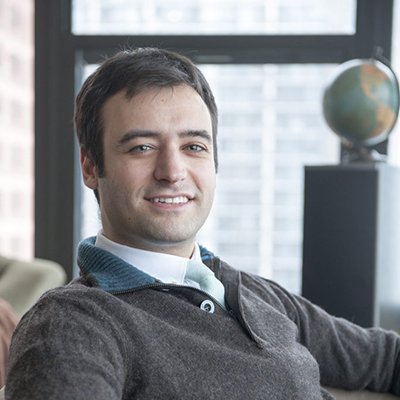
Luca Badetti, a 2015 PhD graduate in disability studies, is Chicago community life director for L’Arche, an international organization of residences for people who have intellectual disabilities.
L’Arche Chicago maintains two residences — Angel House on Chicago’s West Side, and Peace House in Forest Park — with a third scheduled to open this year. Each residence is home to four people who have intellectual disabilities, ranging in age from their 30s to 70s, and three or four assistants.
Financial support comes from state funding and contributions from donors.
In the L’Arche communities, “disabilities labels lose their hold, and the emphasis is on the person,” says Badetti.
Besides Chicago, he’s lived in L’Arche residences in Boston, Washington, D.C., Rome and Trosly-Breuil, France, where the organization began in 1964. Today, there are 147 L’Arche communities in 35 countries.
Badetti presented a TedX Talk in Bend, Oregon, last April, about his four years in L’Arche.
“You can learn to know what it is to be human, and to grow into that,” Badetti says. “There is a simplicity, a living from the heart rather than just the mind, an honesty, and a slower sense of time that I think pinpoints what are the great things about being human.”
As community coordinator, “my role is to support community life, spiritual life and quality of life of the people in the community,” he explains.
His duties range from training assistants to organizing celebrations. “We cook together, go to events in the city, watch TV, pray and hang out.”
Badetti grew up in Rome and Milan before moving to the United States with his parents. He earned a bachelor’s degree from Franciscan University of Steubenville and a master’s from the Institute for the Psychological Sciences.
By living only with people who are like ourselves, “we’re missing a chance to open our hearts,” he says.
“I hope L’Arche can be a sign of peace, a sign that it’s possible and great to live together in our similarities and in our differences.”
Grace Baranek
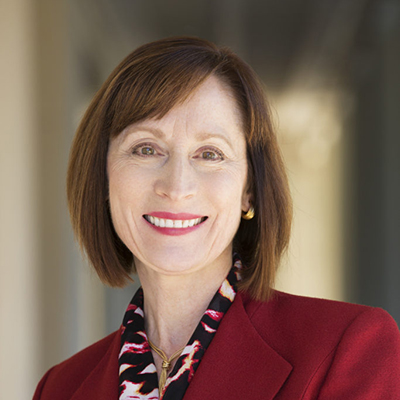
Grace Baranek ’81 BS OT is professor, associate dean and chair of the Chan Division of Occupational Science and Occupational Therapy at the University of Southern California. Her current research concerns early identification screening methods and tools for autism spectrum disorder in infants and children. She led the Sensory Experiences Project, a 10-year longitudinal study funded by the National Institute of Child Health and Human Development on the developmental course, mechanisms and functional effects of sensory features in children with ASD.
“Dr. Baranek is among the top autism scholars in the world and chair of one of the highest-ranked OT programs in the United States,” said Yolanda Suarez-Balcazar, head of UIC’s Department of Occupational Therapy.
Baranek is lead author of the First Years Inventory, a screening tool for infants ages 9-15 months at risk for a later diagnosis of ASD, and the Sensory Experiences Questionnaire, a parent-report tool used widely by researchers to characterize children with ASD.
Her work has been funded by the National Institutes of Health, Department of Defense, Department of Education, the Autism Speaks Foundation and the American Occupational Therapy Association.
“Her scholarly work has had important implications for practice, therefore improving the lives of children with autism and ASD,” Suarez-Balcazar said.
Samantha Bond
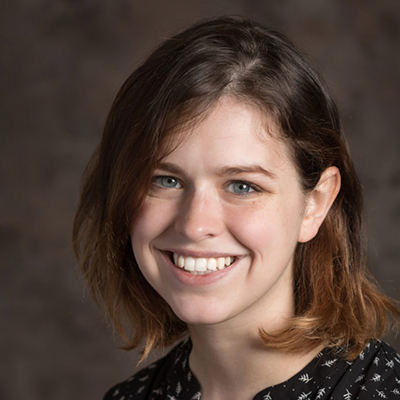
Samantha Bond ’16 MS BVIS is clinical assistant professor of biomedical and health information sciences and physical therapy, and associate director for undergraduate education in the new BVIS Life Science Visualization minor program.
“Sam Bond is an extraordinary teacher, a respected leader in our department and college, and an enthusiastic, young, UIC faculty member devoted to our student’s success,” said John Daugherty, program director of the Biomedical Visualization graduate program.
Bond’s research explores the intersections of health care, game learning, user interaction and medical education. She has won awards for her serious game projects (“serious” video games are created for education and training). She is a Unity certified serious game developer, a board member for the International Game Developer’s Association Chicago chapter and a Women in Games Ambassador for the International Game Developers Association.
Bond is also an award-winning teacher who has received awards at the department, college and campus levels. For the last two years, she has developed and organized the Health Tech Jam, a workshop for students in BVIS, OT, PT and other disciplines that brings them together to brainstorm patient-friendly solutions to health-related problems.
“Over three short years, she has established herself as one of the best instructors I’ve known in my over 30 years of teaching at UIC,” Daugherty said.
Briana Bonner
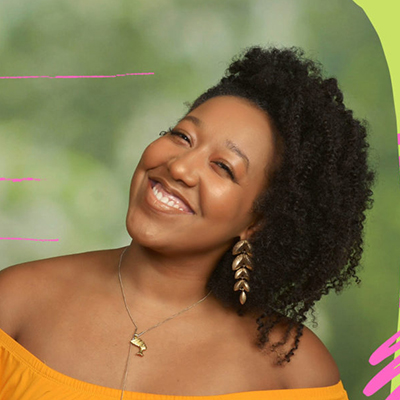
Briana Bonner ’16 MS OT wants to spread the word about occupational therapy around the world.
After four years of practice in the Chicago area and Texas, she made the leap to follow her dream: starting an outpatient clinic providing occupational therapy in Gabarone, capital of Botswana in southern Africa.
“I love it here,” she said.
Her recent doctorate in occupational therapy from the University of Texas Medical Branch will help her go even further.
“I want to help create occupational therapy programs in Botswana and neighboring countries that don’t have them,” she said.
Bonner first came to Botswana for a study abroad program as an undergraduate at Truman State University.
“It was the experience of a lifetime,” she said. “It was amazing, seeing everyone around me look like me.”
Bonner was surprised to learn that Botswana had facilities for children who were deaf or blind, but few services for other disabilities. She returned to the U.S., wondering what she could do to change that.
She hadn’t decided on a career, but “I told one of my mentors what I wanted to do, what I was passionate about and what I saw in Botswana, and she said, ‘You’re an occupational therapist.’
“And I realized, I can totally be myself and sing and dance and act—doing the things I love, while also helping improve somebody’s quality of life.’”
When it came time to choose an OT program, Bonner wanted to return home to Chicago. From the first time she visited the UIC campus, “everybody was just so welcoming,” she recalled.
In her final year of the OT program, AHS Magazine asked Bonner to interview Winifred Scott ’57 BS OT, former OT professor and department head, who had just endowed a scholarship fund for students committed to working in the Black community. Like Bonner, she was one of a small number of Black students in her OT class.
Scott became a mentor, attending her young colleague’s UIC graduation and staying in touch as she began her career. The two share a commitment to increase diversity in the field of occupational therapy.
“I hope to mentor other minority students,” Bonner said. “With my doctorate, I will be able to go more places to educate about occupational therapy.”
Bonner’s clinic, Meribah Occupational Therapy Solutions, had its grand opening in October 2020. “Meribah” is named for the place in Biblical text where Moses struck a rock with his staff to produce water for the Israelites.
“We wanted the clinic to be a place that meets a need for the community, just like Moses provided the needs for his people,” she said.
The clinic sees about 50 patients as it continues to grow. Bonner specializes in pediatric therapy, but she sees both children and adults because there are so few OTs in Botswana.
Autism is not well understood or recognized in Botswana, and working with children who have autism and their families is especially rewarding, Bonner said. In fact, this was the focus of her doctoral dissertation.
“We continue to spread awareness about, not only occupational therapy, but disability,” she said.
Bonner’s biggest challenge: funding. Many people can’t afford private occupational therapy and access to public services is low.
But she is confident about the future.
“I’ve been in school my whole life. I’m excited to take the next step, now that I’ve obtained all this knowledge.
“I said, I think I’m ready to stretch out and open up a clinic. Let’s see where life takes me.”
Sara Burnett
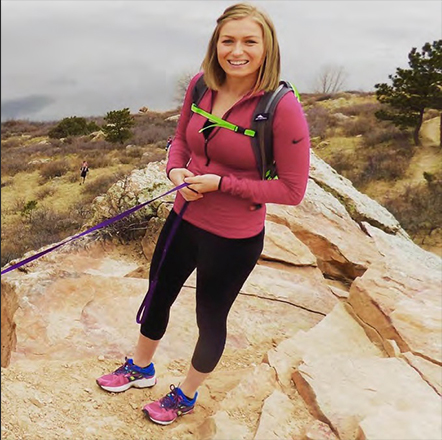
While pursuing a bachelor’s in psychology at UIC, Sara Burnett double minored in sociology and disability and human development. She recently reached out to to thank DHD for the impact the program had on her personal and professional life.
In her letter Sara explains, “before taking DHD classes I had the stereotypical view of people with disabilities, which I am ashamed to admit. If it were not for the DHD program I would have carried my previous ignorance into my career working with people with disabilities. Instead I was able to gain an amazing understanding of disability culture, history, and rights which I was then able to pass on to others.”
After moving to Colorado, Sara started a job as a special education paraprofessional. However, she quickly found she was “embarrassed” by the program’s lack of funding and “understanding and education.” She explains, “the administration had little respect for the special education department, which then negatively affected how the team could help the students.” Sara resigned from her position to look “for work elsewhere to grow personally and professionally.”
Sara is now “super excited to have the opportunity to work with a social services company called Sample Supports located in Northern Colorado. They believe everyone has a right and space in the community and no one should be institutionalized… They never say ‘no’ to taking on new clients, no matter the prior behaviors or offenses, and truly believe in protecting and respecting every client’s human rights.”
Appreciative of the undergraduate program at DHD, Sara explains, “as I continue down this professional path I know for a fact I would not be able to provide this community with the support I do if it were not for the DHD program at UIC. Personally, I think every person should have to take at least one DHD course because it could change the world! Until then I will personally try to provide trust, confidence, and happiness to every person I work with and to educate the general public in the process. The work DHD does is making an impact one person at a time and I am so thankful for what you have provided for me!”
Jean Ragalie Carr
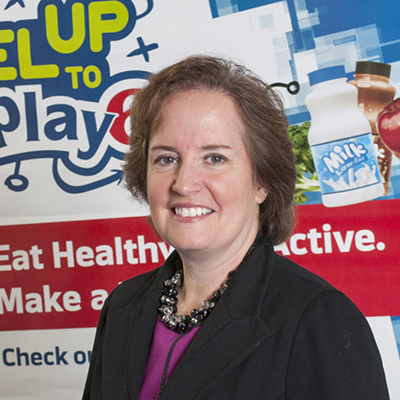
Jean Ragalie-Carr remembers one particularly influential course she took as an undergraduate at UIC: a class on ethnic food. In the course, students were expected to prepare and share dishes, something that she cites as a foundation for what would be her future career in nutrition. “The class made the teaching real life, not just theoretical,” she said.
Ragalie-Carr is the president of the National Dairy Council and treasurer/secretary for Action for Healthy Kids. In 30 years of working in the areas of nutrition, health, and wellness, she has worked in agencies, associations, corporations and health care settings. She has worked for the National Dairy Council and dairy farm families since 1996. In partnership with the National Football League, Ragalie-Carr helped create and lead Fuel Up to Play 60, one of the nation’s largest proven school health and wellness programs, making a difference in more than 73,000 schools and in children’s lives.
With the Academy and Feeding America, her current work revolves around educating people about a healthy, sustainable food supply to feed the world. One of the four principal architects of Action for Healthy Kids, Ragalie-Carr has served on its board of directors since 2002. She has worked with organizations including the White House’s Let’s Move! program and in partnerships with the School Nutrition Association; President’s Council on Fitness, Sports and Nutrition; and World Wildlife Fund.
Ragalie-Carr described three components of her time at UIC that contributed to her success. “First, it provided me a rock-solid, top-tier education,” she says. “Second, it gave me exposure to a variety of ways in which I could use that education in the workforce. And third, I got the experience I needed through internships and experiential courses.”
While reflecting on her career thus far, Ragalie-Carr has some advice for dietitians new to the field: “Be open to many diverse experiences. UIC is a great credential, and it can open many doors for you. When I graduated, I had no idea I’d be able to do all this in 30 years. There is so much more to come for you.”
Vladimir Cuk
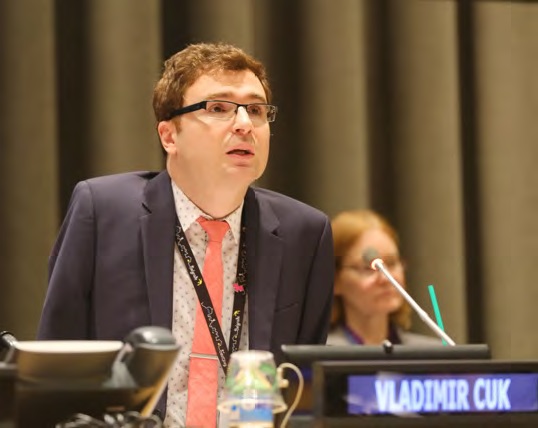
Vladimir Cuk ’07 MS DHD is currently the executive director for the International Disability Alliance (IDA) based in New York. IDA is an alliance of over 1,100 organizations from 14 global and regional networks that encompass 180 countries that works to promote the rights of people with disabilities, particularly the United Nations (UN) Convention on the Rights of Persons with Disabilities (CRPD) and the 2030 Agenda on Sustainable Development within the United Nations framework.
As the executive director, Vladimir supervises staff in New York and Geneva as they work together to promote the rights of people with disabilities, provide technical assistance, and provide a unified message regarding human rights and disability across multiple stakeholders, including the UN and its member states, civil service organizations, and various disability organizations.
Vladimir came to DHD because the department’s multidisciplinary approach helped increase his ability to advocate for people with disabilities internationally. He appreciated the breadth of academic approaches that the department offered while focusing on disability. Vladimir credits DHD for the opportunity to get a formal degree related to disability because of the recognition and credibility that it offers.
The degree helped him obtain his current position and his experiences in DHD improved his confidence to work in a variety of different settings. The knowledge and experience that he received in DHD will continue to be integral to Vladimir’s success in advocating on an international level for the human rights of people with disabilities.
Michael Doyle
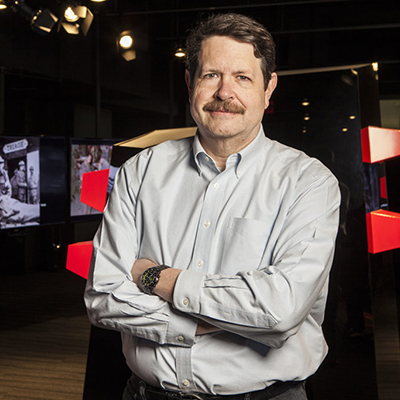
“As a science fair project [in grade school] I designed an artificial gill you could wear and breathe underwater,” says Mike Doyle, PhD. “So I went to college [at the U of I at Urbana-Champaign] thinking I was going into marine biology. During that time—I had already won awards for drawing in high school—I discovered that there’s this great major at Illinois in Chicago where you could combine the two.”
That’s a pretty good summary of Doyle: inventor, scientist, artist, discoverer.
Doyle, who earned a bachelor’s degree in medical art (now biomedical visualization) in 1983, now holds more than a dozen patents for technologies in data analysis, visualization, collaboration and networking. He’s been recognized internationally for his pioneering work in next-generation web applications and 3D technologies for biomedical applications.
In 1994 Doyle founded Eolas Technologies to commercialize the technologies invented at UCSF. If his success was ever in question, that ended when Microsoft built Windows on the system he invented.
Still chairman of Eolas, Doyle is also the founder and president of the charitable Buonacorsi Foundation, which supports numerous arts organizations.
Doyle credits his education as the foundation for his success: “I’m convinced that the multidisciplinary background I had was what led me into doing those kinds of projects.”
Basheerah Enahora
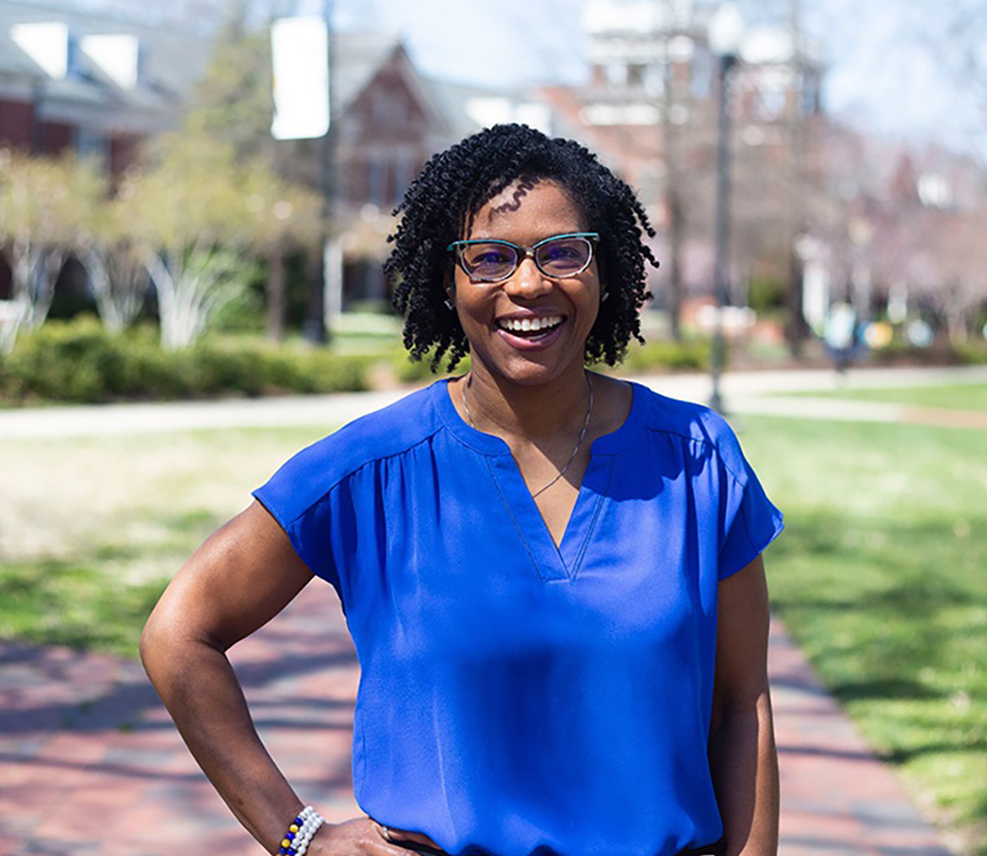
Basheerah Enahora ’15 MS NUT began her career in sales and marketing for IBM and Citigroup. She earned an MBA from Duke University and found success as a brand manager for Kraft and Golden County Foods.
But was the corporate world really where she wanted to be?
“I always had this love of nutrition,” said Enahora, who is now assistant professor of agricultural and human sciences and extension specialist at North Carolina State University.
“I just had this epiphany that I wanted to do something more fulfilling with my interest and excitement around food.”
The AHS master’s program in nutrition launched Enahora into a new, “more fulfilling” career. After graduation, she worked as a clinical dietitian nutritionist at Wake Forest Baptist Health Weight Management Center in Winston-Salem, North Carolina.
She also used her business experience to start her own wellness practice for women, BE Nutrition. The practice, which has an active presence on social media, offers individualized holistic health and nutrition counseling with a focus on mindful eating, gut health and disease, stress reduction and weight management.
“Our mission is to empower women to understand true nourishment and look past the number on a scale as a measure of success,” she says on the BE Nutrition website.
In 2019, she took another big step: enrolling in the PhD program in nutrition at the University of North Carolina Greensboro. As a doctoral student, she co-authored five published articles and received a $25,000 award for her research as a Behavioral Intervention Scholar. She was also named a Minerva Scholar, the university’s highest award for doctoral students.
For her dissertation, Enahora assessed the effectiveness of an interactive virtual reality nutrition program for African American adolescents. She also worked with partnering organizations on how to use the program in the community.
“In research, we can develop interventions and programs where we can affect numerous people at one time, communities at one time,” she said. “I think it just really helps to advance the practitioner’s role.”
Enahora completed her PhD in August 2022 and moved into her latest role as a faculty member at North Carolina State. Her research will continue to focus on health disparities, nutrition and wellness among minority adults and adolescents. In her work with the Extension Service, she plans to enhance nutrition education, develop nutrition and culinary skills programs for minority adolescents and work with extension agents to build healthier schools and communities through collaborative partnerships. She will extend the reach of extension programs using technology like texts and apps.
“I definitely find joy and passion around intervention development, particularly with youth,” she said.
This article was adapted from a UNCG News article by Rachel Damiani, University of North Carolina Greensboro.
Litany Esguerra
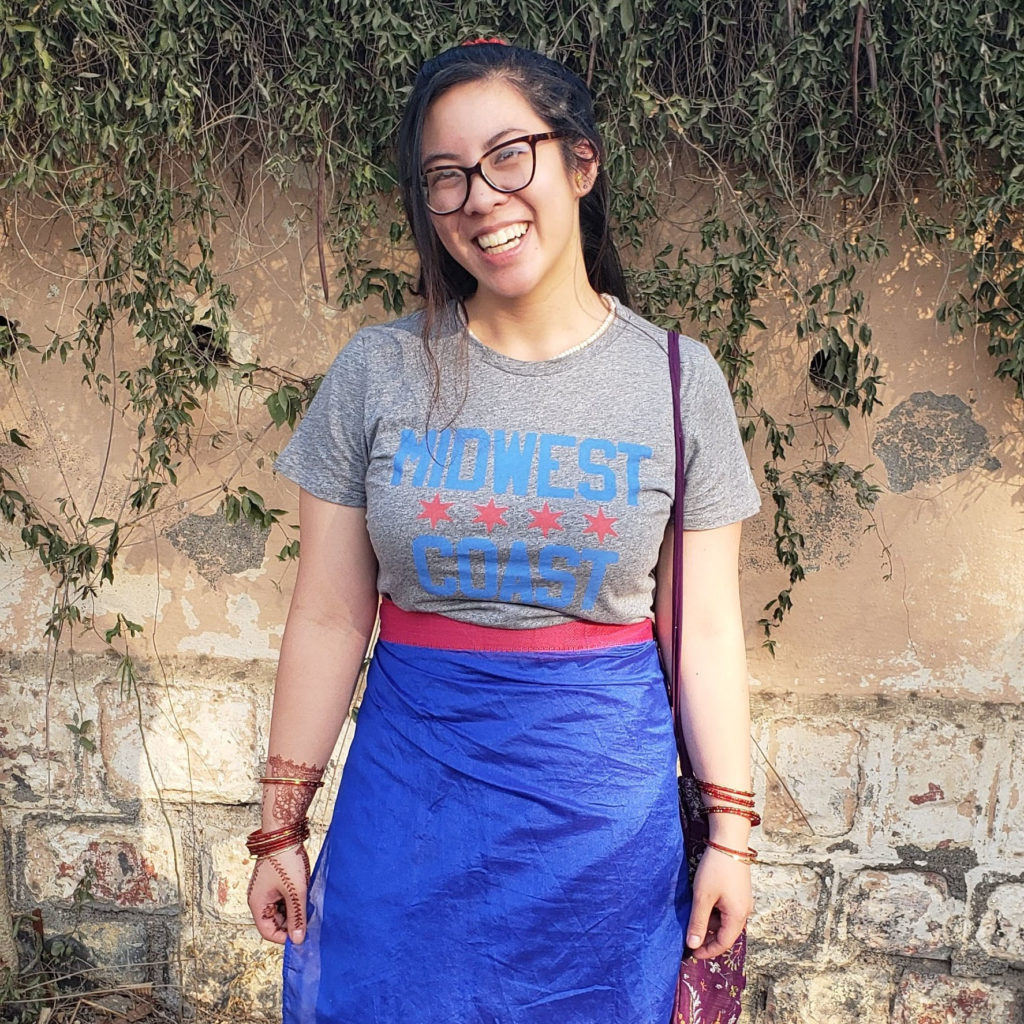
A spirit of adventure and a desire to help others has already taken Litany Esguerra ’18 BS RS from suburban Glen Ellyn to Chicago, Washington, D.C., the Philippines, England and India (twice).
She’s not one to travel a straight line from Point A to Point B. The turns in her path have led her toward a different career than she first envisioned.
“I’m very goal oriented, as opposed to being a planner,” says Esguerra.
“My goal is to work with people, to find a way that my work can contribute to their empowerment. It’s important not to plan every step of the way, but to be strategic.”
When Esguerra, a first-generation Filipino American, came to UIC, she felt at home right away.
“I wanted to go to a campus where diversity wasn’t just a marketing a tool. I connected with lots of other students who were first- and second-generation Americans juggling responsibilities between families, school and jobs.”
The daughter of a nurse and a pastor, Esguerra majored in rehabilitation sciences with plans to become a physical therapist. In her junior year, wanting a break from her science courses, she spent a study abroad semester in New Delhi.
“I needed to do something completely different, to go someplace I wouldn’t otherwise visit,” she says.
The program focused on public health, policy and community.
“In the classroom, we learned about public health in India. Then we’d go to a crowded hospital. Seeing that first-hand was eye opening—until then, I didn’t understand what access to health care really meant.”
For her study abroad research project, she worked with an organization that supplied free prosthetic limbs to the very poor.
When she returned home, her career focus had shifted to disability and access to health care around the world.
After graduation, Esguerra went to Washington, D.C. First, she spent three months as a public policy intern with the National Disability Rights Network, focusing on employment discrimination.
“I had learned about barriers to accessing employment for people with disability through my minor in disability studies, and I applied some of the knowledge I had gained,” she says.
Her next step: four months as an intern on the research and legal team with the Obama Foundation, where she created in-depth reports on potential foundation partners.
“I wanted to work in a mission-oriented organization but learn a completely different skill.”
After she completed her Obama internship, she spent the summer in Manila, where she was an outpatient rehabilitation volunteer at a hospital serving the urban poor.
Then Esguerra returned to India for six months as a community health intern with the Comprehensive Rural Health Project, an NGO that helps the rural poor through a community-based approach to health care and development.
“It was exciting to be in D.C. around other passionate young people, but I wanted be out there, not at a computer screen, to see how people are trying to create better conditions for empowerment,” she says.
In rural Jamkhed, Esguerra did a little bit of everything. She coordinated care plans with international medical teams, worked on donor partnerships with other NGOs, helped with mobile health services, quantified data for grants and served as a communications and general point person for visitors.
Her internship solidified her desire to work towards empowerment and inclusion for people with disabilities on an international level—which took her to graduate studies at the University of Leeds, where she just completed a master’s in disability studies.
Now she’s back at UIC as part of the team developing the UIC Certificate in Co-Operative Career Experience, a federally funded program in the Department of Disability and Human Development. Students with intellectual disabilities will attend classes at UIC through the two-year certificate program, which prepares them for a career in their chosen field.
Her long-term goals? A Ph.D. in health sociology with a disabilities focus, then a position at a university or the World Health Organization, working on health issues in India, the Philippines or “wherever they need me.”
Esguerra has covered a lot of ground in the last few years—in mileage and experience. She said her studies in rehabilitation sciences were a great place to start.
“My major was a stepping stone for exploring anything related to health care,” she says. “Our professors encouraged us to pursue unconventional topics and opportunities.”
Esguerra says two faculty members were especially helpful: retired AHS associate dean Demetra John and clinical professor Michelle Bulanda.
“They were very influential mentors,” she says. “I really appreciate how much encouragement and support they gave the students—so much love and respect.”
Tina Esposito
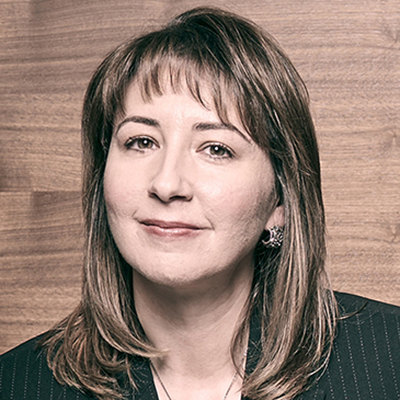
Tina (Stiris) Esposito, a 1997 graduate in health information management, was named one of the “Most Powerful Women in Healthcare IT” by Health Data Management.
Esposito is vice president of Advocate Health Care’s Center for Health Information Services.
The national accolade recognizes women who are driving technology innovation, deploying leading-edge technology and implementing healthcare systems that dramatically increase patient safety and improve organizational efficiency.
“We are so proud that Tina has been honored with this prestigious recognition,” said Rishi Sikka, Advocate senior vice president of clinical operations. “Her leadership helped Advocate advance our data strategy and develop technology solutions that enhance the delivery of safe, patient-focused care.”
Esposito joined Advocate in 1999 as a statistical data analyst at Lutheran General Hospital. She was named director of the Center for Health Information Services in 2008 and promoted to vice president in 2012.
She and her team are responsible for system measurement and analytics to support improved patient outcomes and organizational performance. She is the Advocate executive for strategic oversight of the Advocate Cerner Collaborative to create a population health management platform for Advocate. The platform includes a big data strategy, advanced analytical models and deployment into clinical workflow.
Karen Patena, director of the AHS Program in Health Information Management, remembers Esposito well.
“Tina was an outstanding student,” says Patena. “I’m not surprised by her accomplishments, but it’s always so wonderful to hear when alumni do so well!”
Gail S. Fisher
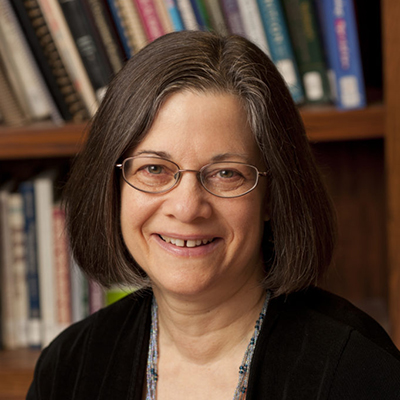
Gail Fisher has served the UIC College of Applied Health Sciences, its students and her profession of occupational therapy for more than two decades.
Fisher is a nationally recognized expert on healthcare reform related to occupational therapy practice. She is former chair and board member of the American Occupational Therapy Political Action Committee.
“To me, Gail is the face of UIC occupational therapy,” wrote the person nominating her for the Loyalty Award.
She teaches courses related to health care and occupational therapy delivery systems, the impact of policy and payment trends on practice, and advocacy. Her current research concerns the effects of the Medicare therapy cap in long-term care settings.
Fisher is alumni liaison for the AHS Department of Occupational Therapy and heads a committee working to preserve the department’s history. She has served on dozens of committees—often as chair or co-chair—at the department, college and campus levels.
William Frey
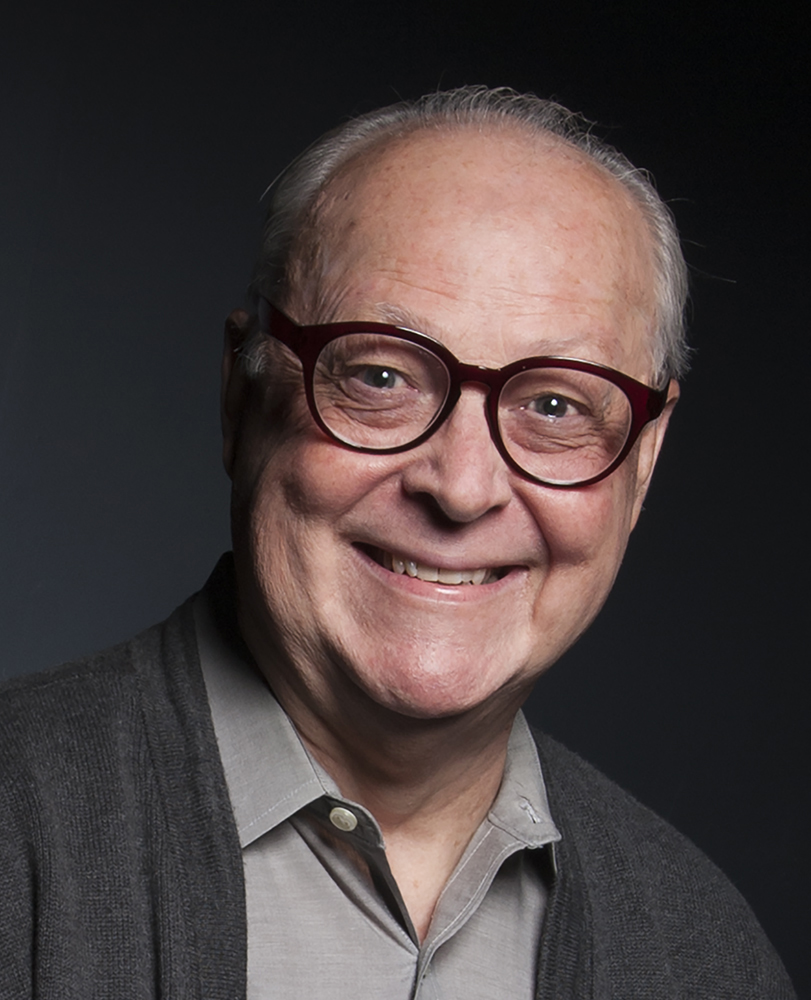
Since the day he left his hometown of Manteno, William Frey ’71 BS OT has been on a path to greater learning, responsibility and service to others. His journey led to full-time faculty positions at five universities, four degrees, two hospital leadership positions, the national presidency of Alpha Eta honor society — and an endowment for scholarships to UIC occupational therapy students.
It all started at the University of Illinois. “It was the only school I applied to. I was accepted and BAM! my horizons expanded,” he recalls.
He chose occupational therapy “because I knew I wanted to be in health care, but I wasn’t certain I wanted to pursue more than a bachelor’s degree.” At that time, OT studies began with three years on the Urbana-Champaign campus, followed by two years on the Chicago campus.
“Those two years in Chicago were very intense,” he says. “When you left, you felt you were equipped to go out and do something.”
Besides a degree, he gained a life companion — classmate Carol Jackson, “a brilliant clinician,” he says. Frey joined the Army Medical Specialist Corps and the couple moved to Fort Benning, Georgia. “The Vietnam War was going on, and I needed to do my part.”
At Fort Benning, Frey developed new occupational therapy programs, including cardiac rehabilitation. He earned a master’s of education at Georgia State University and completed his service with the rank of captain and an Army Commendation Medal. From his experience, he learned he liked to lead. “That sparked my interest in pursuing hospital administration,” he says.
He completed a master’s in health administration at Washington University. The residency required for his degree turned into a job as vice president of the 644-bed Toledo Hospital in Ohio. He oversaw almost every aspect of hospital operations, handling situations that included a major fire and the hospitalization of a Romani prince. “You learn from everything,” he says.
Through his work at the hospital, he became involved in child abuse prevention. He served as chair of the Lucas County, Ohio, Child Abuse Prevention Center, receiving the Mary E. Liles Award for his work. He and Carol also became foster parents to two siblings.
After five years, Frey felt it was time for his next step: a Ph.D. As he earned his doctorate in medical sociology at Ohio State University, he was the university’s assistant director of allied medical professions, shepherding programs through accreditation. He missed health care practice, though, and left to become CEO of the Rehab Hospital of York, a new for-profit medical rehabilitation hospital in Pennsylvania.
“It was very, very different,” he says. “Before that, I had worked for government or not-for-profit organizations. In a for-profit enterprise, how do you provide quality care and earn a profit? How do you track that? I got involved in developing quality assessment and setting up quality assurance programs in Pennsylvania and throughout the multi-hospital system.”
He planned to complete his dissertation at the same time — an unrealistic proposition, it turned out. He returned to academia and joined the faculty at Slippery Rock University, where he completed his research and developed undergraduate and graduate programs in health services administration.
“Most of our graduate students were health care providers going back to school while working,” he says. “I held classes around my kitchen table at night to make sure they could get their coursework.”
Frey took his enthusiasm for teaching nontraditional students to the University of St. Francis in Joliet, then St. Mary’s College in San Francisco, both pioneers in distance education and adult learning. During his time in the Bay Area, he was chair of the Arts and Culture Commission of Contra Costa County.
Then family ties took him east to Memphis, where he became dean of the College of Allied Health Sciences at University of Tennessee. In one of his proudest moments, he was the first allied health dean to speak at commencement for University of Tennessee Health Sciences Center.
When Carol became seriously ill, however, he retired and they moved to their dream home on the Cumberland Plateau near Knoxville. “We had a great year together,” he says. They were married 42 years until her death from pancreatic cancer in 2013.
In establishing the endowment for the Jackson-Frey Scholarship, Frey remembered his own background as the son of a homemaker and a factory worker, first in his family to attend college.
“I would not be where I am now, I would not have had these experiences, without my University of Illinois degree,” he says. “It’s time to think about the next generation.”
The scholarships, which begin in four years, will be awarded to occupational therapy students who are military veterans, preferably first-year students in OT. “I want to help UIC be seen as a welcoming institution for veterans,” he says.
These days, Frey volunteers with an adult literacy program and the Friends of the Library. He likes to travel — he made his first trip to India in November.
But his main avocation is the theater. Wherever he’s lived, he’s performed in regional and professional productions, including “My Fair Lady,” “Damn Yankees” and “Annie Get Your Gun,” opposite former Miss America Kellye Cash. His home stage now is Cumberland County Playhouse, where he will appear in four plays this year, including “Beauty and the Beast” and “Sister Act.”. “It adds a lot to my life,” he says.
Mike Gapski

When the champion Chicago Blackhawks head onto the ice, they know Mike Gapski is behind them.
Gapski, a 1982 graduate in physical education (the forerunner to today’s kinesiology program), is head athletic trainer for the three-time Stanley Cup winners. He was recruited by the Blackhawks in 1987, after four years as a trainer at UIC.
“I’ve been a Blackhawks fan my whole life,” he says. “I consider these guys my friends, not just people I work with.”
Gapski says he’s always on call. “On a game day, typically, we’ll get in at 8 in the morning to treat guys who need treatment. After practice and the pregame skate, players go to lunch, and I do my paper work. At about 4 o’clock, the guys come back, and we do whatever we have to do to get ready for the game. If it’s a home game with a 7:30 start, I usually leave [the United Center] at about 11:30 or midnight.
“For away games, we travel as soon as the game ends. Right after the game, we’ll do our treatments really quick, then jump on a plane. We’ll do treatments again on the plane. And we get to our hotel rooms between 1 and 3 in the morning.”
Despite the demanding schedule, “I don’t look at it as a job; I look at it as fun,” Gapski says. “You can’t be a phony in this job. You have to truly care about the guys, truly care about the team.”
When he started college, Gapski was interested in applied sports nutrition. He sought out a career counselor who introduced him to several exercise physiologists and then-UIC head athletic trainer Carol Humble. Their advice started him on the career path that led to the Blackhawks.
“You have to continue to learn all the time because complacency will get you nowhere,” he says. “Doesn’t matter if it’s your first year or 20th year, you always look for some way to better yourself, some way to help the guys out.”
Craig Goodwin Gosling
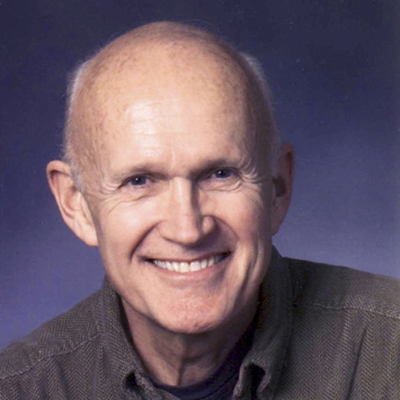
Craig Gosling showed his loyalty to Biomedical Visualization at AHS by giving not only his time and counsel to students and faculty over five decades—he also donated the full collection of his own illustrations.
Gosling was director of the Indiana University School of Medicine’s Department of Medical Illustration from 1972 to his retirement in 2001. He led a variety of projects, from anatomically correct simulators for medical teaching to bronze sculptures honoring university leaders and benefactors. He introduced the nation’s first aesthetic art and sculpture course for physicians training in plastic surgery.
For his accomplishments, he received the Association of Medical Illustrators’ Brödel Award for Excellence in Education and the AMI Lifetime Achievement Award.
Gosling gave his collection—hundreds of pen-and-ink illustrations created over his long career—to UIC as a technical resource and source of inspiration for future generations of biomedical visualization students.
Robert Gould
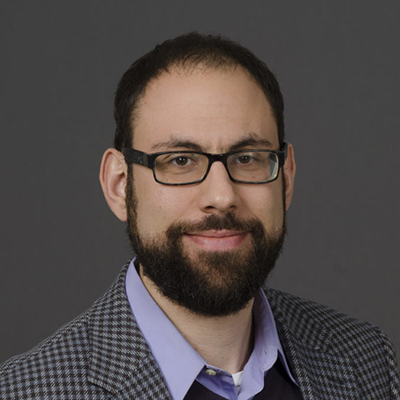
Robert Gould ’11 MS DHD, ’16 PhD DIS is a researcher and scholar who works closely with community organizations in Illinois to increase the inclusion of people with disabilities in the workforce.
He is also involved in projects with AHS alumni and fellows in Uganda, including Patrick Ojok ’15 PhD DS, to improve the lives of people with disabilities in the East African nation.
Gould is director of research and assistant clinical professor at the Great Lakes ADA Center in the Department of Disability and Human Development.
He serves on the board of Illinois nonprofit organizations promoting the rights and inclusive employment of people with disabilities, including the State Independent Living Council and APSE (Association of People Supporting Employment First).
“His volunteer work extends well beyond his workday as he continuously engages with the groups that he seeks to impact in his teaching and research,” said Tamar Heller, DHD distinguished professor and head, who nominated Gould for the alumni award.
Gould spent a month in Uganda through a 2019 Professional Fellowship Program on Inclusive Disability Employment, awarded by the Association of University Centers on Disabilities and sponsored by the U.S. Department of State Bureau of Educational and Cultural Affairs.
He led training and discussions on international human rights and worked with members of the Ugandan government to shape disability policy. He also helped raise money for solar panels to power computers at a rural school.
Gould teaches courses on the ADA, disability and work, law and policy, and world cultures.
Previous honors he has received include the AHS Humanitarian of the Year Award, the UIC Teaching Recognition Program Award and the UIC Award of Merit.
Tim Grover
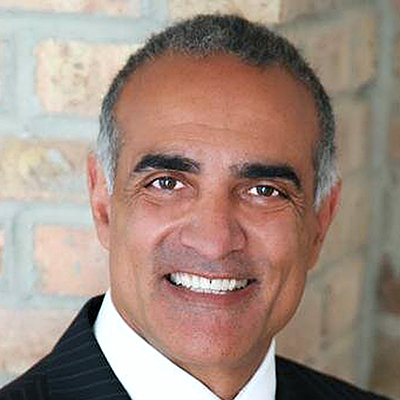
Tim Grover ’84 BS KINES, ’86 MS KINES, the CEO of ATTACK Athletics Inc., received the 2018 AHS Distinguished Alumni Achievement Award. Grover is a businessman, author, consultant and trainer.
Since 1989, Grover has been a leader in the science and art of physical and mental dominance in athletics. Grover is world-renowned for his legendary work with elite champions and Hall of Famers, including Michael Jordan, Kobe Bryant, Dwayne Wade and hundreds of other professional and Olympic athletes.
ATTACK Athletics provides training and rehabilitation services designed to push athletes to the top of their game. Grover’s cutting-edge programs focus on strength, agility, speed and performance. “You won’t be as good as you were,” Grover tells his clients. “You’ll be better than ever.”
In addition to collegiate and professional athletes, Grover also helps business leaders and elite achievers accomplish their goals. Grover travels the world as a consultant and keynote speaker, teaching the principles of relentless drive, results-driven performance and mental toughness.
He is the author of “Relentless: From Good to Great to Unstoppable” and “Jump Attack: The Formula for Explosive Athletic Performance, Jumping Higher and Training Like the Pros,” as well as the creator of the digital training platform “The Relentless System.” A featured columnist at SI.com and Yahoo.com, Grover also appears on ESPN, Fox Sports and other media outlets.
Grover, the 2017 AHS spring commencement speaker, played NCAA Division I basketball at UIC. The dual alumnus holds a bachelor’s degree in kinesiology and a master’s degree in exercise science. In 2010, UIC honored Grover with a Lifetime Achievement Award; he was inducted into the UIC Hall of Fame at that time.
Carol Humble
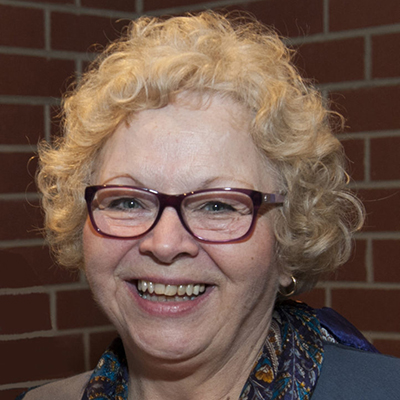
As UIC’s head athletic trainer from 1985-1997, Carol Humble trained, mentored and inspired countless students. Her guidance helped produce leaders like Chicago Blackhawks head trainer Mike Gapski and Northern Illinois University head trainer Phil Voorhis.
Besides her work with UIC student athletes, including daily training and travel with the teams, Humble was educational coordinator of the college’s athletic training internship specialization. She helped students complete their educational requirements for National Athletic Trainers Association certification.
Humble was co-founder and vice president of the Chicago Sports Medicine Society and the UIC Sports Medicine Committee. Her support helped establish UIC’s Sports Medicine Clinic.
Humble is an active and enthusiastic alumna who organizes social gatherings to connect UIC graduates working in the profession.
Marie Jarrell
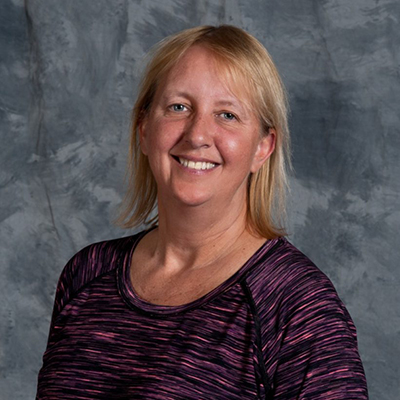
Volunteer service is an essential aspect of life to Marie Jarrell ’87 BS PT.
In memory of her parents, she founded the Sunbow Foundation in 2016 to spread random acts of kindness in the community. Since then, Sunbow’s acts of kindness have included providing supplies for neighbors to build a ramp for a youngster with spinal bifida, paying for a flight to reunite a cancer patient and his brother, donating and setting up furnishings for an apartment for a formerly homeless woman and her children, and providing a dress and accessories so a teen could attend her prom.
A cancer survivor and triathlete, Jarrell has raised more than $100,000 over nearly 20 years to benefit the Leukemia and Lymphoma Society. She is head marathon coach in Illinois for its Team in Training program, which organizes endurance sports events to raise funds for cancer research.
As a physical therapist, she has worked in almost every clinical setting: outpatient, acute care, home care, skilled nursing and acute inpatient rehabilitation.
She is now program manager for continuous quality improvement at Briotix Health, which provides industrial sports medicine to businesses to prevent injury and keep workers healthy.
Jarrell is a certified Road Runners Club of America (RRCA) running coach, USA Triathlon coach and Ironman coach. She has completed many half marathons, marathons, century rides, triathlons and one Ironman triathlon.
Arnold Lee
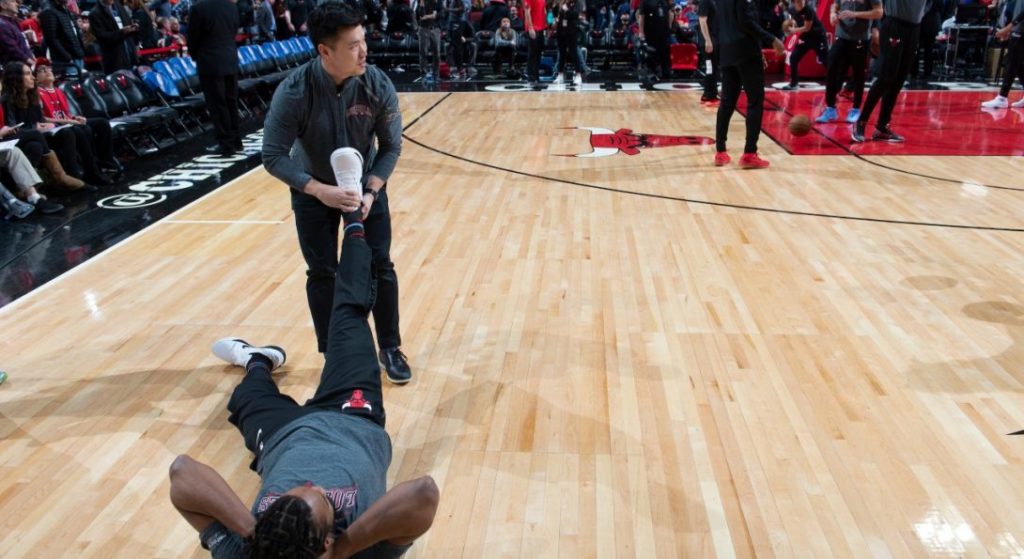
Arnold Lee ’10 BS KINES knows how lucky he is.
A longtime Chicago sports fan, he has a dream job—assistant athletic trainer for the Chicago Bulls.
“I didn’t think that your passion and your career could be the same thing,” Lee says.
Lee started UIC as a pre-dentistry major, but he found his career path in an introductory kinesiology class taught by Karrie Hamstra-Wright, KN clinical associate professor.
“Karrie had such an impact on the direction of where I wanted to take my career. I don’t think she really knew how much impact she had,” says Lee.
The experience of Lee’s father, who had moved to the U.S. from South Korea, was another influence. Although he had an MBA in his native land, his career aspirations were stymied by the language barrier and an immediate need to support his family. At one point, he worked three manual labor jobs to make ends meet.
“He was forced into this career to provide for his family,” Lee says. “That was always ingrained in me.”
After graduating from UIC, Lee earned an MS in athletic training at California Baptist University. In his first job, as athletic trainer at Kennedy-King College on Chicago’s South Side, many of his students used sports to access higher education and emerge from poverty.
“I formed so many bonds that I could never replace,” he says. But after three years, “on a career level, I felt like I wasn’t growing, like I needed to move on.”
Lee considered switching careers; he was newly married (to Jane Ahn ’11 LAS) and felt the responsibility of providing for his own family.
Then he got an athletic training internship with the Chicago Bears for summer training camp and preseason.
“I found the joy in my career again,” he says.
He was hired as head athletic trainer for the Windy City Bulls, the Chicago Bulls Development League Team in the NBA G League. A year later, he moved up to become Bulls assistant athletic trainer in 2017.
Lee, who is a certified athletic trainer, strength and conditioning specialist and corrective exercise specialist, works to keep the Bulls in top physical shape during the playing season and in the offseason. Before each game, he stretches the players and does tissue work. Throughout the year, he also leads injured players through therapeutic exercises and, along with the strength coaches, monitors them in the weight room.
“I love helping people return to health and the bond that you form with your athletes,” he says.
Alison Liddle
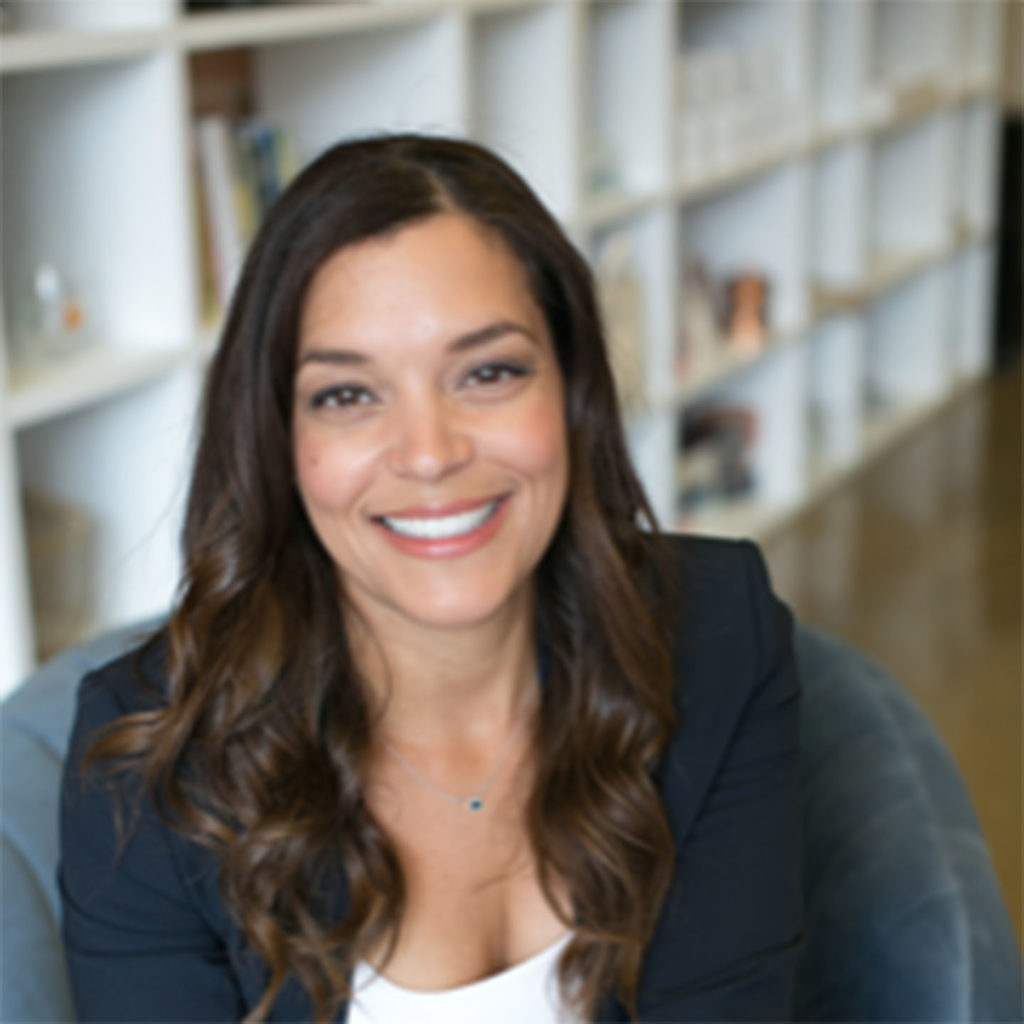
When Alison Liddle ’98 BS PT was a kid, if she didn’t have after-school activities, she volunteered at the pediatric nursing home where her mother worked.
Volunteering was integral to their family life and she loved spending time with the children who lived at the facility.
“I thought, ‘I could do this for the rest of my life,’” says Liddle.
And she has.
Liddle’s mission is to bring access to health care to underserved populations. She is founder and CEO of M Street Pediatric Therapy, which brings early intervention services to the homes of children with developmental delays and disabilities in the greater Chicago area.
Her staff includes 34 therapists who provide physical therapy, occupational therapy, speech therapy, feeding and lactation support, nutrition counseling and behavioral support. Two staff members handle the business end.
Liddle and her twin, Alisa, who are biracial, were adopted from foster care as toddlers and grew up in mostly-white Bloomingdale.
When it came time for college, both enrolled at UIC; Alisa studied business and Alison chose physical therapy.
“I found a home at UIC. I found a place that appreciated diversity and welcomed it.”
After graduation, Liddle began her career at Cook County Hospital.
“I learned a lot about the inequity of health care,” she says. “We think people have access to care, but that’s not always true. Sure, you can get physical therapy at County, but if you can only get an appointment every six months, that’s not access to care.”
Frustrated with the system, Liddle enrolled at the University of Chicago for a master’s degree in health policy and administration.
“UIC prepared me to be a physical therapist, but I didn’t have the bigger picture,” she says. “I was interested in learning more about how systems work together.”
While she was in grad school, Liddle continued her PT practice, taking referrals to provide in-home early invention for high-risk infants on the South and Southwest sides.
Visiting clients at home was an eye-opening experience.
“I’ll be honest. Working in the clinic, you make assumptions about why somebody doesn’t do what’s in their best interest. ‘Why aren’t you doing the exercises we gave you?’
“Then you go into their home and realize they live in a basement, in one room with concrete floors, and it is freezing. Their environment is going to dictate how well they will be able to carry out the recommendations I’m making.”
As Liddle completed her master’s degree, “it became very clear that I would have to choose: do I want to continue to be a clinician, or do I want to transition completely to this other world of public policy?”
She realized she loved the challenges and opportunities of providing in-home early intervention care to children and their families. She also saw the isolation and lack of support for clinicians who provide in-home care.
So she combined what she learned from her two degrees and started her own agency.
The health care system needs more therapists doing early intervention in underserved neighborhoods—especially practitioners of color, Liddle says.
“When you look at the amount of diversity within physical therapy, it’s embarrassing.”
That’s one reason training and mentoring students from UIC, Northwestern, Midwestern and Rush universities is important, she says.
She praises AHS faculty for connecting her with outstanding students and alumni, many of whom have joined M Street as interns or staff.
“I wouldn’t be in the place that I am, had I not gone to UIC,” Liddle says. “My educational experience at UIC set the professional foundation for my life, and I’m forever grateful.”
Eric Meredith
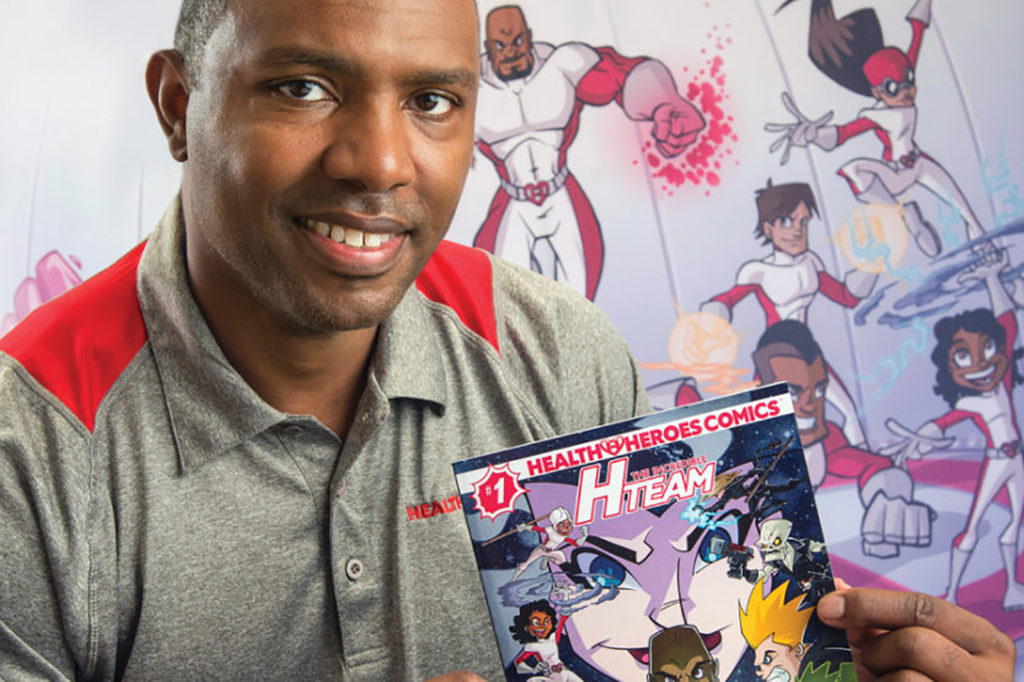
Kids love superheroes. Kids need to live healthier lives. Would they listen to a bunch of pumped-up pre-teen comic characters who save the planet while delivering messages about the values of exercise, nutrition and a healthy lifestyle?
Wowie zowie yes!, says Eric Meredith, founder of Health Heroes comics and a three-time UIC graduate (1994 bachelor’s degree in business, 2012 master’s in nutrition, 2015 master’s in education).
“What you do as a child plays a big role in what you do as an adult,” says Meredith. “An obese child has an 80 percent chance of becoming an obese adult. So I tapped into my inner kid to look for fun, engaging ways to reach children, and I came up with comics.”
His comic book, featuring The Incredible H-Team, presents a cover of kinetic kids with clenched fists over the admonition, “Unleash Your Inner Hero!” It’s available in paperback or as a Kindle download.
Meredith grew up in Roseland on Chicago’s South Side, where he was a three-sport athlete in high school. After serving in the Navy, he earned a degree in information systems from UIC. He worked for McDonald’s Corp., Lotus and IBM, then gave up his corporate career for a longtime passion: cooking.
After earning a culinary degree in 2007, Meredith launched a meal delivery service called Alter EatGo to help combat obesity in the African American community. He did on-air cooking demos as a media spokesman for the March of Dimes and the American Heart Association, billing himself as “America’s Healthiest Chef.” He’s a registered dietitian, certified personal trainer and youth exercise specialist.
To reach young people, you can’t lecture—“you’ve got to engage them,” Meredith says. “It’s all about reaching kids early, at that age when kids aspire to do something, when they want to be their best self.”
Mary Mirabelli
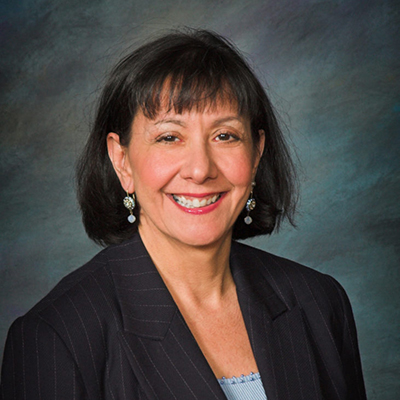
Mary Mirabelli ’79 BS OT received the AHS Distinguished Alumni Achievement Award, the highest honor bestowed upon alumni of the college. The award recognizes Mirabelli’s outstanding career success and
international renown in the healthcare field. Mirabelli is currently senior vice president at the Healthcare Finance Management Association (HFMA), where she is responsible for all content created and delivered to the industry and HFMA membership.
Previously, Mirabelli held leadership roles at DXC Technology (as global leader of the Strategic Advisory Healthcare practice), Hewlett Packard Enterprise’s Global Healthcare Practice (as vice president) and the Hospital Corporation of America (as a senior executive), among other organizations.
“Mary’s impressive professional career is not only a testament to her expertise in the complex areas of finance, business development, information technology and executive management, but also to the extraordinary occupational therapy education at the foundation of it all,” says Bo Fernhall, AHS dean and professor of kinesiology and nutrition. “She has developed a highly unique and diversified career in executive health care, demonstrative of the many career trajectories available to an AHS graduate. We could not be prouder of her many professional achievements.”
As a student at AHS, Mirabelli received an award for Outstanding Personal and Professional Achievement. She recalls her AHS experience fondly, noting that the courses were difficult, but the professors were fantastic.
“They were true pioneers in the field,” she says. “The skills I learned have been off-the-charts invaluable to me in my career.”
Mirabelli has served on numerous governing boards and committees and is currently a member of a portfolio company board for Riverside Partners, LLC. She holds a master’s in management from Northwestern University’s Kellogg Graduate School of Management.
Edward Mirzabegian
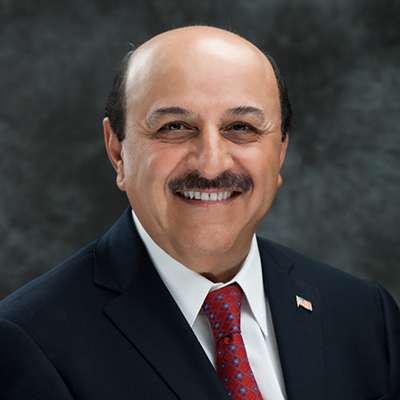
Over his 25-year career as a health care executive, Edward Mirzabegian ’79 BS MLS has helped improve the operations and finances of many under-performing hospitals and health care systems.
When he became CEO of Antelope Valley Hospital in Lancaster, California, he helped turn an accumulated $18 million loss into a $24.6 million profit over three years.
As regional CEO for Prime Healthcare Services, he oversaw operations and finances for 15 hospitals throughout California. At the same time, he was chairman of the board for West Anaheim Medical Center and La Palma Intercommunity Hospital
Mirzabegian was corporate CEO of Avanti Hospitals Healthcare System, a 470-bed system of hospitals in southeastern Los Angeles.
He was chief operating officer for HealthCare Partners IPA, one of the largest provider/IPA companies in New York, where he managed 2,200 primary care physicians and 8,500 specialists.
At Mercy Health System of Northwest Arkansas, where he was executive vice president and chief operating officer, he participated in planning and process for a $140 million replacement facility.
His early career included several positions in Illinois, including vice president of clinical services at Bromenn Healthcare in Bloomington, vice president of operations at Centegra Health System in McHenry and vice president of patient care services at Memorial Medical Center in northern Illinois and Lutheran General Hospital in Park Ridge.
Mirzabegian returned to his current position as CEO at Antelope Valley Hospital in 2019, after leaving in 2013. Antelope Valley is the only acute-care, full-service hospital in the area.
Staci Molinar
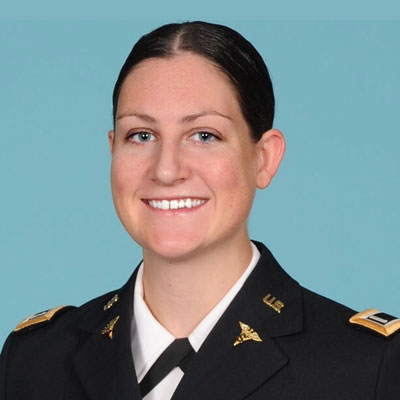
It’s hard to greet the dawn with a five-mile run and a 50-pound backpack. But as Capt. Staci Molinar sets out on her morning ruck march, she thinks about her patients — soldiers grievously injured in mind and body, who face enormous challenges but persevere. “Seeing folks who are dealing with that kind of situation — the rest of us have no excuse,” she says.
Molinar ‘10 BS KINES, ‘12 MS OT is chief of clinical operations for the 212th Combat Operational Stress Control Unit at Fort Campbell, Kentucky, which includes coordinating behavioral health services for the 86th Combat Support Hospital.
She leads a 28-member team: soldiers trained as occupational therapy assistants and behavioral health technicians, a social worker, psychologist, chaplain and psychiatric nurse.
Ten have already deployed to Afghanistan. Molinar and the others will go to Kuwait this fall. They will staff a center for combat stress and post-traumatic stress disorder, treating soldiers stationed in the region. She is one of only five Army occupational therapists training a team for duty in an active war zone.
“One of the big things about the military is that they hand you a ton of responsibility,” says Molinar, who is also staff occupational therapist in orthopedics at Blanchfield Army Community Hospital. “Being in charge at first seems overwhelming, but it is super motivating. It drives you to push forward.”
Molinar and her team help prepare soldiers before deployment and assist them after they return. Besides occupational therapy, the services they provide include neuropsychological triage, psycho-educational classes, resiliency training and prolonged exposure therapy. In the hospital or outpatient clinic, they see patients who have behavioral illnesses like PTSD or traumatic injury, including loss of limbs.
Molinar’s 18-hour days start at 4:30 a.m., when she heads to her office to catch up with paperwork. From 6 to 7:30 a.m., there’s physical training. The rest of the day might include team training, hospital rounds and “lots of meetings.”
“But every day is different,” Molinar says. “A lot of the work I do is fun, honestly. You get to do things you would never do — learning to navigate through the forest, firing weapons. It makes the days go by quickly.”
Molinar considered joining the military after high school, but her parents insisted on college.
At AHS, “I had mentors who helped me figure out where I wanted to go and develop the best plan to get there,” she says, mentioning Gail Fisher in occupational therapy and Karrie Hamstra-Wright in kinesiology.
When a recruiter told her about the opportunities available to Army occupational therapists, her path became clear.
The application process took about two years; Molinar worked as a school occupational therapist until she began officer training in 2013. She was commissioned a first lieutenant and assigned to Fort Sam Houston in San Antonio, Texas, where her clinical rotations included orthopedics, traumatic brain injury, behavioral health and burn and amputee rehabilitation. While there, she completed a DSc. in occupational therapy through a joint program between the Army and Baylor University.
“The military is good about providing you with opportunities to learn and grow,” says Molinar, who has been awarded the Army Commendation Medal and the Army Achievement Medal. “Professional development is really important.”
Molinar’s long-term career goal is research and teaching; her dream assignment is the Army Research Institute of Environmental Medicine. For now, she looks forward to her deployment to Kuwait, possibly in late summer or fall.
“It’s the best opportunity for me and my soldiers to do our true jobs, to use the skills we’ve been working on for the past couple of years,” she says. “It’s what we train every day for.”
Laura Mraz
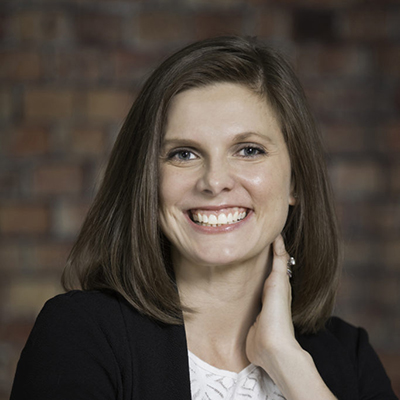
Laura Mraz ’10 MS OT, ’11 OTD is the CEO and founder of Eyas Landing, an outpatient pediatric therapy clinic that provides multidisciplinary services for children and adolescents, and Blue Bird Day, an intensive therapy program that offers multidisciplinary services in a preschool and kindergarten setting. The two practices, both located in Chicago, together serve about 370 clients weekly, with about 170 full-time staff.
Mraz opened Eyas Landing in 2007, the same year she completed a bachelor’s in psychology at Loyola University. She opened Blue Bird Day seven years later; it now has two locations.
“Laura is an innovator and entrepreneur who has changed the face of pediatric private practice in Chicago,” Suarez-Balcazar said. “She has used her AHS education to greatly expand therapy and education options for many families who have a child with a disability.”
Mraz embodies the OT department’s Scholarship of Practice Model. She is active in training and mentoring AHS students as a guest lecturer, adjunct instructor and fieldwork supervisor, and her clinic is a research site for OT faculty, including associate professor Mary Khetani and professor Renee Taylor.
For several years she helped organize, host and fund a gala that raised more than $100,000 for Autism Speaks. In 2017, she received the SPARK Autism Hero Award and she is a SPARK advisory team member.
“Laura is a trailblazer who does UIC and AHS proud,” Suarez Balcazar said.
Ryan Parrey-Munger
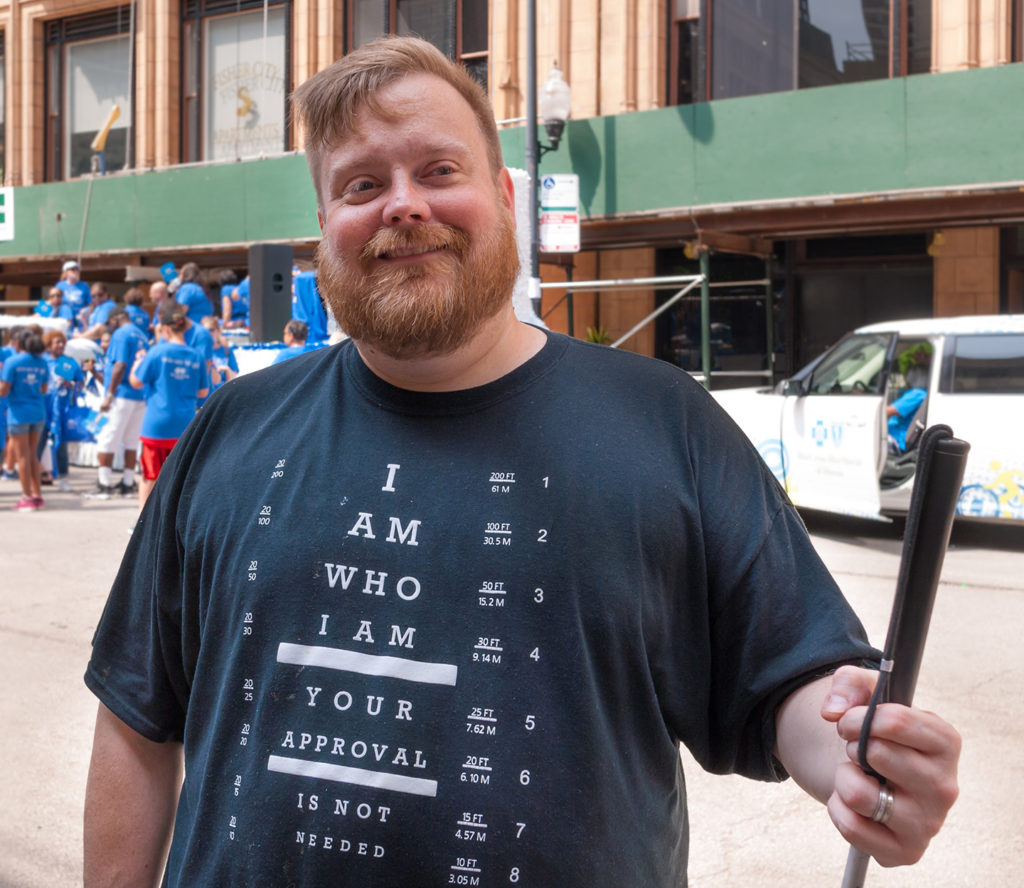
Ryan Parrey-Munger ’13 PhD DS is lecturer and acting director of the Disability Studies Certificate Program at Eastern Washington University (EWU).
In his current position, Ryan helped develop a disability studies minor at EWU while continuing to develop new course offerings. He is also involved in building relationships with community partners and developing service-learning projects with those organizations. Describing himself an activist-scholar, Ryan’s research interests are in social interactions between people with and without disabilities.
Ryan believes DHD helped him to grow as a disability studies academic. He credits the interdisciplinary setting at DHD with developing a teaching style that works with people from a variety of disciplines and with diverse career trajectories. He appreciated being able to work with and beside scholars, activists, and professionals with such varied backgrounds, which has helped him network with colleagues across his campus.
Amar Patel
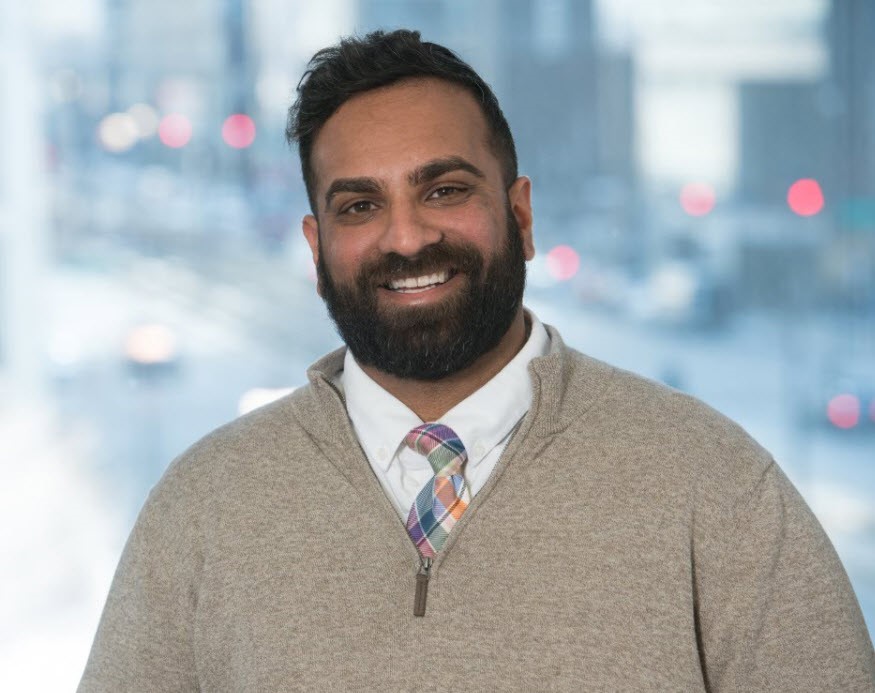
When Amar Patel ’07 BS HIM started college, he wanted a career in health care, but he was also interested in business.
He found just what he was looking for with a degree in health information management.
His career offers the best of both worlds, says Patel, manager of client success at Allscripts Healthcare Solutions, one of the world’s top health care IT companies.
“You get to work on the business and technology side of health care, and you get to interface very directly with the clinician,” he said.
Patel’s team works with ambulatory care providers—both small clinics and large medical groups—to implement Allscripts’ TouchWorks electronic health records platform.
“I always enjoy talking to clinicians and hearing them say, ‘Now that I have this software, I’m not taking home a bunch of papers every night.’ And patient care is improved because they have the data they need.”
Patel, who grew up in Des Plaines, graduated from Maine West High School and took some of his prerequisite courses at Oakton Community College before enrolling at UIC.
He already felt comfortable there. His father had been a CT technician at UI Health and as a kid, Patel often came along when his dad was called in on weekends.
Not long after Patel started the HIM program, electronic health records “really started taking off,” he said.
“It was a right time, right place type of scenario. I was always interested in technology and innovation and I knew I could pivot, not into a traditional, medical records health information management role, but into something different in health care.”
The week after graduation, he started working at Allscripts. He found the job through networking with other HIM alumni. Since then, he’s hired and mentored other grads, including Navjot Singh ’14 BS HIM and Sara Baig ’13 BS HIM.
“UIC prepares you to hit the ground running,” Patel said, praising faculty members like Karen Patena, HIM clinical associate professor.
He has only good things to say about his field, which offers travel, flexibility and the challenge of solving problems to improve health care delivery. Most of his career has been at Allscripts, although he also worked at Joint Commission Resources and RightSourcing Inc.
“Every day is different,” he said. “I’ve never had to be in an office Monday through Friday.”
In his first job, as implementation consultant, “my role was to help hospitals and health care organizations implement their EHR. This meant looking at all sorts of things that would impact their workflow, coming from paper to electronics. My job was helping them get the application up and running.”
Now he manages a team of implementation consultants.
“To be able to provide leadership and mentorship, to guide them to be better consultants, is one of the pieces that I really like about my job. I enjoy innovating health care and mentoring my team.”
Karen Patena
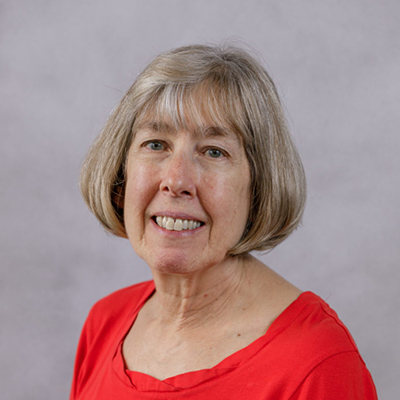
Karen Patena ’74 BS MRA was honored with the 2019 AHS Loyalty Award in recognition of her significant contributions, service and dedication to the college in general and to the Department of Biomedical and Health Information Sciences in particular. As associate head of the department, as well as clinical associate professor and director of the health information management (HIM) degree programs, Patena has been a remarkable advocate for students and faculty alike.
“Karen is an effective teacher and mentor, who draws the respect from those that work with her in every aspect of our academic mission,” says Anthony Faiola, professor and head, Department of Biomedical and Health Information Sciences. “Without question, Karen exemplifies the meaning of the AHS Loyalty Award.”
Patena’s accomplishments include the development of the Illinois Board of Education’s online postbaccalaureate certificate program in Health Information Management and the introduction of a blended BSHIM degree at AHS, which allows students to take both online and in-person courses.
During her 26 years at UIC, Karen has received numerous accolades for teaching excellence, including the UIC Silver Circle Award and the AHS Educator of the Year Award. She is active in HIM professional organizations both regionally and nationally and serves on several campus committees.
David Reavy
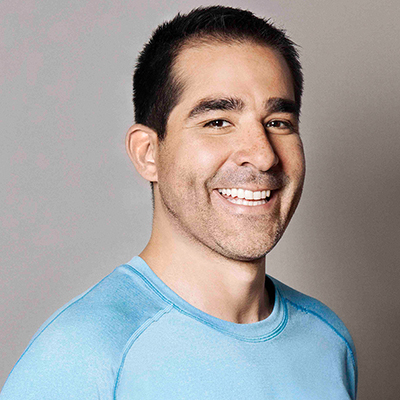
David Reavy’s fiercely loyal clientele includes world-class athletes like Matt Forte, Joakim Noah and Tracy McGrady.
“David refuses to accept limits for himself or his patients, and with that defiant attitude has created a new way to practice physical therapy and improve people’s lives,” read the letter nominating Reavy for the AHS Distinguished Alumni Achievement Award.
Through clinical work at React Physical Therapy, the practice he founded in 2008, Reavy developed a unique approach to physical therapy called the Reavy Method. This approach focuses on the whole body, not just treating the injury site.
Reavy’s goal is to change people’s ideas about what is possible for their bodies. Clients say his approach tranforms their pain and discouragement into a plan for recovery.
Reavy believes in giving back to UIC and the community. Many of the staff at React are AHS physical therapy graduates and the facility is a clinical training site for the college’s doctoral students in physical therapy. He supports Chicago nonprofit organizations including Mercy Home for Boys & Girls and the Heartland Alliance.
Reavy and his work have been featured in the Chicago Tribune, Prevention, SELF, Shape and ESPN Chicago. He is a regular contributor to Men’s Journal.
Vanessa Ruiz
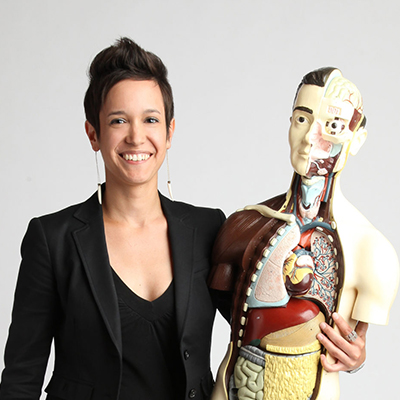
Vanessa Ruiz is the driving force behind Street Anatomy, an online art gallery that showcases human anatomy in art, design and pop culture. Since its 2007 launch, Street Anatomy has published more than 1,000 posts that feature human anatomy in drawings, tattoos, 3-D printing, interior design, fashion and other media.
Ruiz conceived Street Anatomy as an AHS student, fascinated by the surge in street art and the lack of public knowledge about the profession of medical illustration. Today, her website is a fully branded platform with an international following and nearly 100,000 followers on Facebook (Street Anatomy is also on Instagram and Twitter).
Ruiz was a featured speaker in November 2015 at TEDMED 2015 in Palm Springs, California. Her speech was live-streamed to more than 200,000 viewers in some 140 countries.
After graduation, Ruiz was associate art director, then senior art director, at AbelsonTaylor healthcare marketing agency. She now works in healthcare user interface and product design.
“Whether it be through cartoons, body painting, or street art, anatomical art has the power to reach far beyond the pages of a medical textbook,” Ruiz says in her TEDMED Talk, “ultimately connecting our innermost selves with our bodies through art.”
David Scalzitti
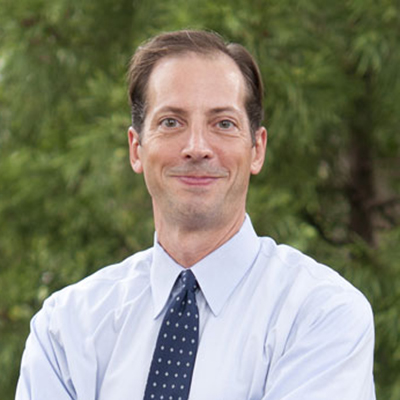
David Scalzitti is the college’s own three-peat. He earned a bachelor’s in physical therapy in 1987, a master in kinesiology in 1994, and a doctorate in disability studies in 2008—all from AHS.
When he received his distinguished alumnus award in spring 2013, Scalzitti was a lead specialist in the Evidence-Based Resources Department of the American Physical Therapy Association.
With the APTA since 2002, he had been a leader in moving the profession toward evidence-based practice as associate editor of two APTA resources: “Hooked on Evidence,” a database of extractions of articles related to physical therapy interventions; and “PTNow,” a web portal that helps clinicians translate the newest research for application. Those roles made Scalzitti a critical player in delivering the substance of extensive research articles to practicing therapists who can apply the knowledge to patient care—all with APTA’s express goal of helping therapists “improve patient outcomes, reduce unwarranted variation in practice, and demonstrate value to the health care system.”
Scalzitti’s road from UIC to today included more than the APTA. He had posts as a practicing therapist in hospital and outpatient settings, and for 10 years after finishing his MS degree, he was also a part-time instructor in AHS’ Department of Physical Therapy. The job would turn out to be good training, he says, for his current endeavor: assistant professor of physical therapy and health care sciences at George Washington University in Washington.
A Chicago native, Scalzitti cites his experience at UIC as having not only prepared him for his career, but for having influenced it. In particular, he says, “Harry Knecht (former head of PT) had such a passion for research literature and for PT, and he gave me an awareness of my interest in those areas. He was also a great influence on the PT faculty, who are in their own right leaders in the profession.”
Carrie Shaw
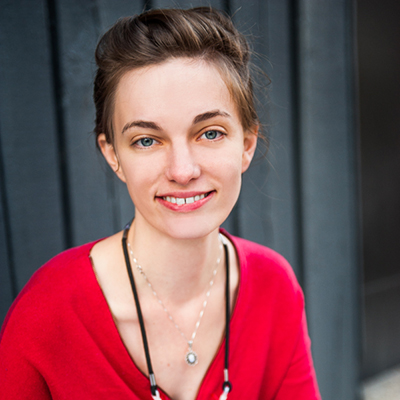
Carrie Shaw ’16 MS BVIS, the recipient of the 2019 AHS New Alum Award, is the CEO and founder of Embodied Labs, an immersive education and wellness platform for professional and family caregivers and the elders they serve. Embodied Labs evolved out of Shaw’s final research project in the AHS biomedical visualization program.
“We are accustomed to working with exceptional students who are both accomplished scientists and highly talented visual artists,” says John Daugherty, director and clinical assistant professor of the biomedical visualization program. “However, in addition to these attributes, Carrie displayed a level of empathy and compassion for others that was striking.”
Using a mix of virtual reality technology and research backed storytelling, the company helps individuals experience different medical conditions. Shaw’s desire to transform patient care is inspired and informed by her experiences as a caregiver for her mother, who was diagnosed with younger-onset Alzheimer’s disease when Shaw was 19.
In 2018, Embodied Labs won a $250K Grand Prize award from the Bill & Melinda Gates Foundation’s XR in Education Prize Challenge and was named a Grand Prize Winner of the AARP’s National Caregiving Innovation Challenge.
Shaw holds a BS in public health from the University of North Carolina at Chapel Hill.
Savannah Soppet
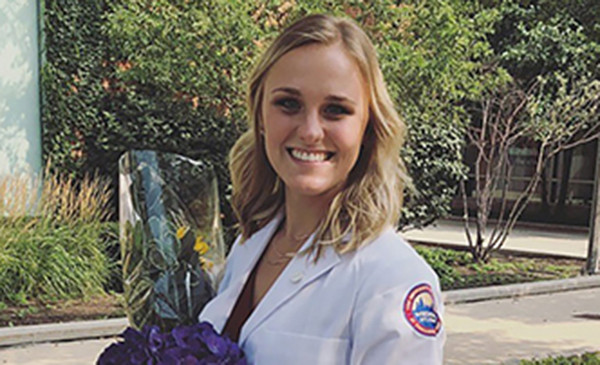
The knowledge Savannah Soppet ’17 BS KINES gained in the classroom and the laboratory helped get her admitted to the UIC College of Medicine. The lessons she learned on the softball field, she uses every day.
“Time management. Teamwork. The mental aspects of getting through something that’s really hard—to push through, focus and grind it out,” she says.
Most of all: “You have to be prepared for whatever is thrown at you, and be able to react.”
A native of Beecher (pop. 4,300) in Will County, Soppet was a three-time high-school conference winner when she was recruited by the Flames.
“Chicago was a culture shock at first, but I needed to get out and see the world.”
Soppet started as a biology major, then switched to kinesiology.
“My second year I took anatomy, and I couldn’t see myself sitting in a biology class any longer. I liked the science and the sports aspect.”
An outstanding student-athlete, she had one of the team’s top batting averages and a perfect GPA that kept her on the Horizon League Honor Roll. She didn’t consider becoming a physician until she worked as an undergraduate research assistant with Joseph Colla, associate professor of emergency medicine.
“‘You’re going to medical school,’ he told me. ‘You’re going to be disappointed if you don’t,’” Soppet remembers.
Because of her softball schedule, Soppet couldn’t apply to medical school as a senior. She took a gap year, working as a medical scribe in the emergency department at Advocate Trinity Hospital on the Southeast Side.
She plans to practice emergency medicine, eventually specializing in critical care. Her undergraduate studies in kinesiology gave her a solid foundation in the importance of wellness and preventive health care, as well as social and other determinants of well-being.
Kinesiology faculty members she recalls as especially influential include Craig Horswill, Lisa Chin Goelz and Michael W. Jones ’10 BS KN, ’13 MS KN, ’13 DPT, former director of the human cadaver lab.
Her gap year didn’t set her back, Soppet says—it pushed her forward.
“I think the best physicians are the ones who have experienced the world first,” she says.
Neeta Suresh Kanekar
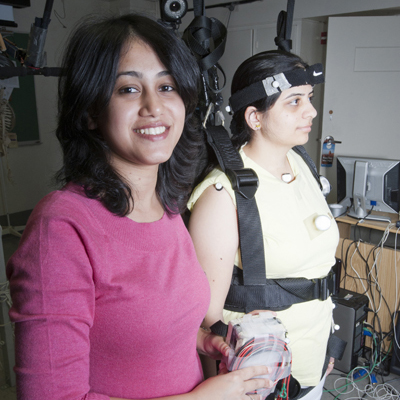
Neeta Kanekar is building an impressive career as a researcher working to improve the lives of people with stroke.
Kanekar came to UIC after earning a bachelor of physiotherapy at Maharashtra University of Health Sciences in Nashik, India. After completing her master’s degree in physical therapy, she was awarded a two-year predoctoral fellowship training grant from the American Heart Association/American Stroke Association. The award funded her research as a principal investigator studying the mechanisms and enhancement of postural control in individuals with stroke.
Her current research focuses on the organization and execution of human movement and postural control, particularly related to motor learning, neural plasticity and movement rehabilitation.
Kanekar has volunteered with You’re the Cure, the AHS/ASA’s grassroots public information and advocacy network. She has given her time to HelpAge India, which fights isolation and neglect among India’s seniors, and Alert India, which fights leprosy through prevention and treatment.
Raja Talati
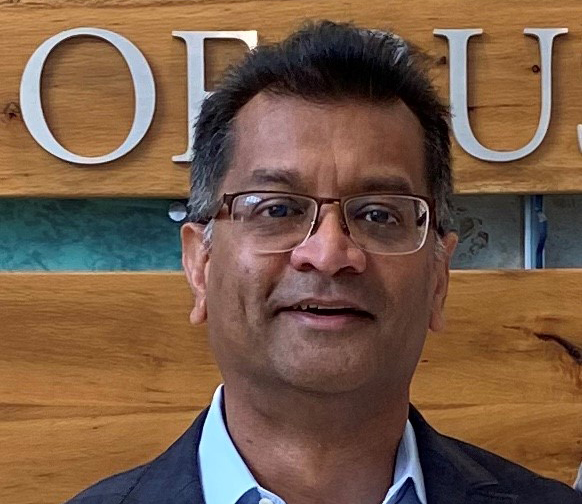
“Technology should translate to better patient care,” says Raja Talati ’14 MS HI.
As a physician, teacher, researcher and medical information officer, Talati is well-equipped to make that happen.
He was recently promoted to colonel in the Air Force Reserve, where he is functional champion and chief health informatics officer at the Defense Health Agency, a joint integrated combat support agency of the Army, Navy and Air Force medical services.
“My coursework at UIC provided me with a rich background in health IT,” says Talati. “Without my training at UIC, I think this position would not have opened up to me.”
Talati was previously chief of aerospace medicine in the Air Force Reserve at MacDill Air Force Base in Tampa, Florida. He is clinician and chief medical information officer at Midway Specialty Care, a nonprofit practice for HIV and other infectious diseases with offices in Florida and Guyana.
As a primary care physician, he has practiced in many different settings: urgent care, juvenile detention, multidisciplinary outpatient clinics and hospitals.
In April 2020, he served a two-month deployment at Jacobi Medical Center in the Bronx, where he and his Air Force team helped care for COVID-19 patients. In July, he helped treat Florida’s surge of COVID patients at a hospital near his practice in Ft. Pierce.
Everywhere Talati looks, he sees potential technology solutions for problems in health care practice.
“IT can and will help make health care better, but we haven’t found that sweet spot yet,” says Talati.
He has high praise for the UIC health informatics program, with its strong foundation in IT governance and data security. The degree has helped expand his career, he says.
“I get to see patients, I get to play with computers, I get to create new knowledge. What more could somebody ask for?”
Brian Taliesin
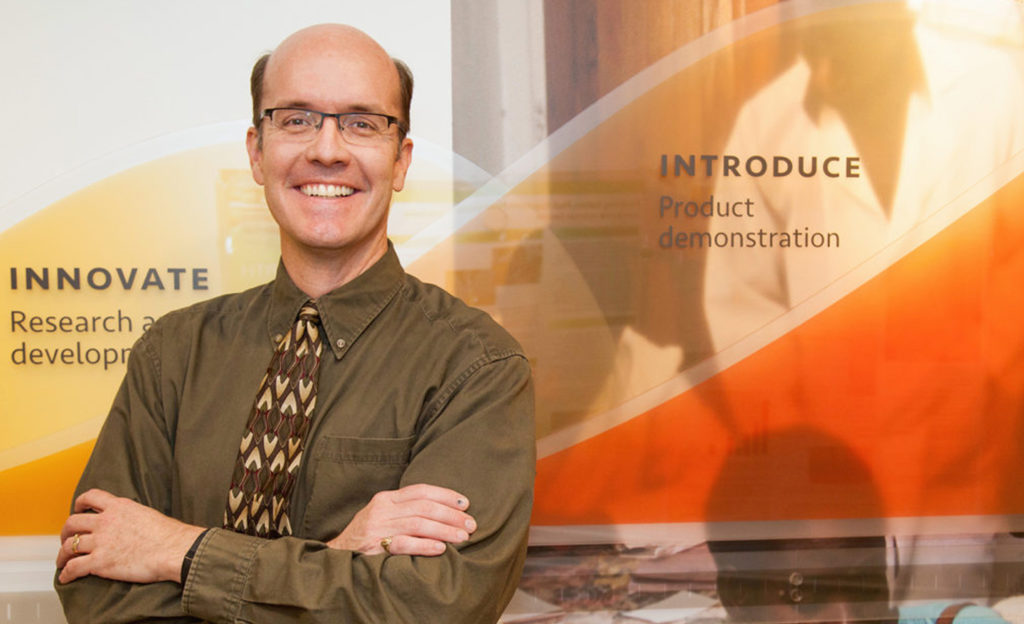
The passport for Brian Taliesin, a 2013 master’s graduate in health informatics, is covered with entry stamps from Ethiopia, Kenya, Liberia and Zambia. He’s visited Tanzania more than 12 times in the last three years.
Taliesin travels to transform lives. He is senior program officer and systems analyst for PATH, a Seattle-based global health organization, working to improve vaccine availability and accessibility in sub-Saharan Africa.
Although vaccines against illnesses such as polio, tuberculosis, rubella and tetanus have been around for years, these preventable diseases are still killers in many developing countries. Taliesin works on the Better Immunization Data Initiative team, funded by the Bill & Melinda Gates Foundation. The initiative forms partnerships with countries to develop improved systems for collecting and using immunization data, so those who need vaccines actually get them.
“Health informatics is the connection among people, data and technology,” Taliesin explains. “We want to improve these connections to make a better system.”
Health workers at Tanzania’s 6,000 clinics were already collecting data on immunizations before the initiative started in 2013, but the process was error-prone and time-consuming. Data that could have predicted disease outbreaks was lost in mountains of paperwork. Some clinics experienced vaccine shortages when supplies were available elsewhere.
The initiative began implementing a national immunization registry. At birth, each child is issued a unique identification number on his or her health card. When the child arrives at a clinic for a vaccination, a health worker scans the ID number into an electronic system. In clinics without access to electricity or the internet, health workers complete paper grids for each child vaccinated, scanned later at another location.
“The registry helps with monitoring patient schedules, predicting supply needs, scheduling clinics and general forecasting,” Taliesin says. The initiative’s goal is to follow 2 million Tanzanian children annually.
Esmeralda Vazquez
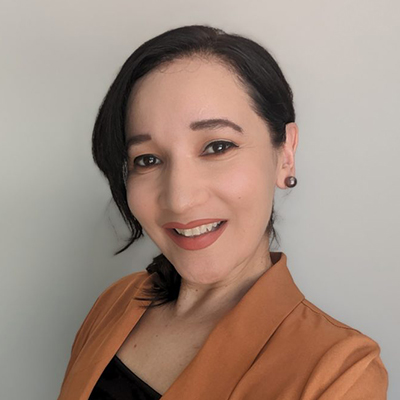
Esmeralda Vazquez ’03 MS ’15 OTD is a “lived experience expert” for the National Hemophilia Foundation.
It’s a fitting title. Vazquez, who has an ultra-rare inherited bleeding disorder, is a community voice for others with similar conditions who are struggling to navigate the disparities of a complicated health care system.
To honor her advocacy, the hemophilia foundation named her 2022 Mary M. Gooley Humanitarian of the Year.
“Within the inheritable bleeding disorder community, Esmeralda Vazquez’s name is synonymous with health equity and patient-centric care,” the award citation read. “Through her championing of subject matter expert voices (particularly those of BIPOC community members) and her work embedding patient input within the research process, Esmeralda Vazquez has dedicated her life to ensuring that everyone’s voice matters within the inherited bleeding disorders community’s paths.”
Vazquez is an occupational therapist with her own Early Intervention Program practice, Stepping Stones Therapeutics. She works with children up to 3 years old and their families, making home visits to clients in the Back of the Yards and Englewood neighborhoods.
She is also an OT in the wheelchair and seating clinic at Shirley Ryan AbilityLab and works as needed as an inpatient pediatric OT at Lurie Children’s Hospital.
Vazquez grew up in a Spanish-speaking family on the South Side. Her practice focuses on underserved populations in low-income neighborhoods—immigrant families like hers who face language and cultural barriers to resources, especially health care.
“It helps me understand the socioeconomic stresses they experience,” she said.
“I feel like I’m a more empathetic health care provider, because I understand the health care disparities that people experience.”
Vazquez has Glanzmann’s thrombasthenia, an inherited disorder that causes prolonged or spontaneous bleeding. It affects 1 in 1 million individuals worldwide. Her brother also has the disorder.
Her condition is stable now; she’s planning a hiking trip to Easter Island next year.
“But I spent a lot of my childhood hospitalized. I grew up in in the hospital,” she said.
“It led me to the field of occupational therapy. Being familiar, as a patient, with the health care system has informed my practice in occupational therapy and my work with the National Hemophilia Foundation. And occupational therapy helped me become a better advocate in the bleeding disorders community.”
Having a rare disorder also means Vazquez must constantly advocate for herself.
“Many health care providers don’t understand the disease, so I have to educate them if I need a procedure like getting my wisdom teeth out. I have to be aware of insurance and how our health care system works. Because I’m in health care, I can navigate that more easily people who aren’t, like my brother.”
The hemophilia foundation, which has awarded about $22 million to bleeding disorders research, is developing a more patient-centered research agenda in partnership with people who have bleeding disorders and their families.
Sharing patient input is an important part of Vazquez’s mission.
“All those social determinants of health that I experienced, all that I do in the community—I bring that knowledge to the National Hemophilia Foundation and say, ‘These are the communities you are trying to serve.’
“One of the main things that I do is bring that minority voice to the table.”
Lauren Warnecke
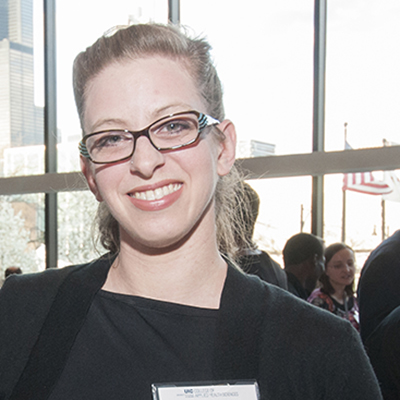
Lauren Warnecke has combined her experience as a dancer, her graduate degree from UIC and her knowledge as a personal trainer to forge a career as a dance journalist and advocate for dance education and dancer health.
For her master’s degree in kinesiology, Warnecke studied the incidence and treatment of injuries sustained by professional dancers. She developed a website for the dance community, ArtIntercepts.org, to promote “evidence-based practices in training and performance.”
A spokesperson for the dance community in Chicago, she is a regular contributor to Windy City Times, SeeChicagoDance.com and Chicago Magazine. Her work appears in online publications such as Huffington Post.
Warnecke is a certified personal trainer through the American College of Sports Medicine, with specialty certificates in functional training and sports performance and weightlifting.
Paul M. Wright
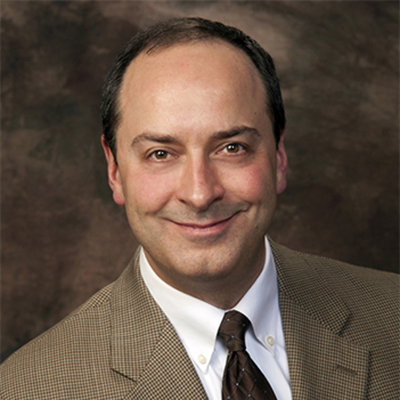
When Paul Wright was a graduate student in kinesiology at UIC, he joined the department’s outreach programs for underserved youth in low-income neighborhoods.
His experience led him to become a leader in improving the lives of young people around the world through sport and physical activity.
As a researcher and professor at the University of Memphis in Tennessee from 2002-2011, Wright focused on obesity prevention and a national initiative to increase physical activity among children in Head Start Centers. He was honored as 2011 Volunteer of the Year by the YMCA of Memphis and the MidSouth.
Now at Northern Illinois University, Wright is director of the Physical Activity and Life Skills Group, which promotes healthy development and life skills in children through physical activity programs. In 2013, he received a grant from the U.S. Department of State to develop the Belizean Youth Sport Coalition, which promotes youth development and social change through sport in the Central American nation. He was invited to lecture in Finland and Germany for the European Master’s Degree in Sport and Exercise Psychology.
Wright supports a number of youth-focused community organizations in DeKalb, Illinois, and Chicago, including Adventure Works Inc. and Beyond the Ball.
He holds the first endowed professorship in the NIU College of Education.